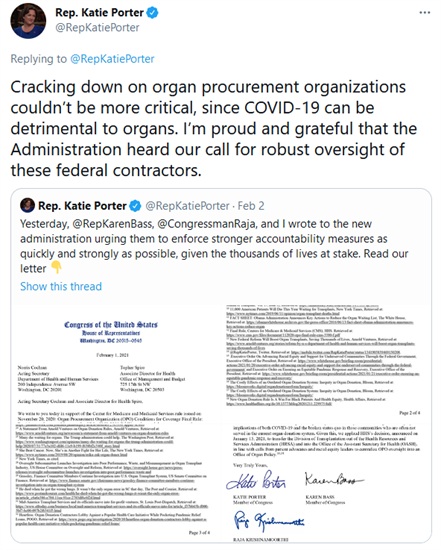Dear Friend,
As your Representative, I promised I would fight to drive down healthcare costs and improve the quality of care for Orange County families. That’s why I’ve been working for two years to stop corrupt practices in the healthcare industry, especially among organ procurement organizations and dialysis providers.
This month is National Donate Life Month, a time to commemorate organ donors and encourage others to register. Approximately 33 people die every day while waiting for a critical transplant, or they are removed from the waiting list after being deemed too sick to receive a transplant. I have urged our government officials to enforce stronger accountability measures for organ procurement organizations (OPOs), the non-profit entities responsible for evaluating and securing organs from those who have decided to donate.
For two years, I've been fighting for stronger oversight of organ procurement organizations, which the Department of Health and Human Services estimates fail to recover thousands of organs each year.
Until recently, the only data we had about the performance of OPOs was self-reported. That’s because the agency tasked with oversight never established accurate and appropriate reporting policies. The OPO serving Orange County, OneLegacy, reported an organ recovery rate of 69% between 2012 and 2014. In reality, a new study found that the organization only recovered 31%. Meanwhile, a 2010 audit found rampant waste and fraud at OneLegacy.
So, when the Trump Administration issued an executive order to improve our nation’s transplant system, I wrote to top health officials calling for appropriate and necessary oversight for organ procurement organizations. I am proud to say that our bipartisan efforts were successful, and new accountability measures were finally released late last year. In February, I wrote to the Biden Administration, urging them to enforce these patient protections as quickly and strongly as possible, with thousands of lives at stake. Just last month, I joined my colleagues in the House and Senate in writing to the Administration, asking again for transparent and reliable outcome measures of our country’s organ procurement system.
One year into the COVID-19 pandemic, we know that the virus can harm kidneys. In fact, since the start of the coronavirus pandemic, the rate of kidney failure has risen to the highest it has ever been in our lifetimes. The long-term harm of COVID-19 is likely to increase the need for organ transplants, making these reforms more urgent than ever. Long before the pandemic, I prioritized investigating dialysis providers and so-called patient advocacy groups that in reality put patients’ lives at risk and increase the cost of care. In July 2019, I called for an investigation into the dialysis industry. I had heard complaints that patients were being pushed toward more expensive insurance options to increase dialysis center profits and to prevent patients from getting kidney transplants.
As your Representative, I will continue to fight for patients and for those who have chosen to give the gift of an organ upon passing but haven’t had their wishes honored. We owe it to the more than 110,000 patients and growing who remain on the organ transplant waitlist to address this issue as quickly as possible. To stay up to date on how I’m representing you and California's 45th District, please follow me on Twitter, Facebook, and Instagram at @RepKatiePorter and visit my website at www.porter.house.gov to subscribe to our newsletter for updates.
Very truly yours,

Katie Porter
Member of Congress


